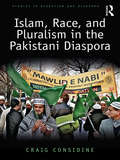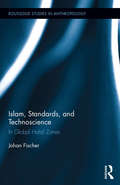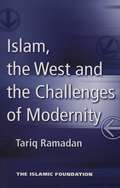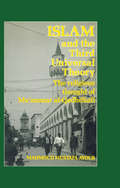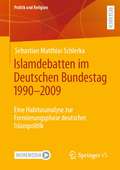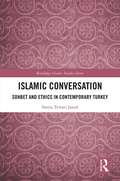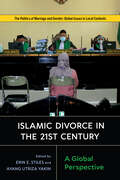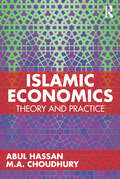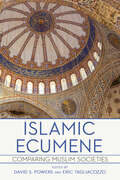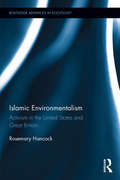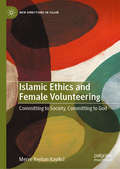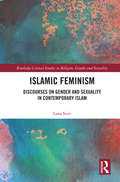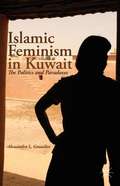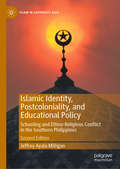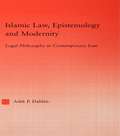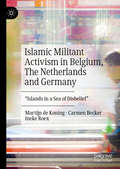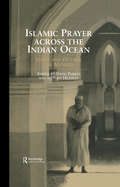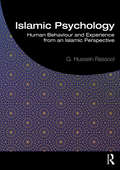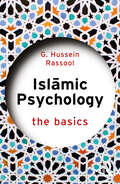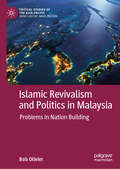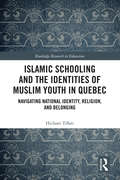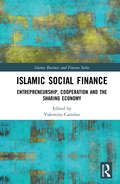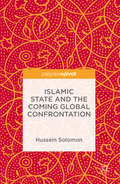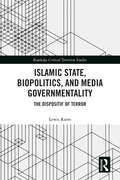- Table View
- List View
Islam, Migrancy, and Hospitality in Europe (Literatures and Cultures of the Islamic World)
by Meyda YeğenoğluThis book cuts across important debates in cultural studies, literary criticism, politics, sociology, and anthropology. Meyda Yegenoglu brings together different theoretical strands in the debates regarding immigration, from Jacques Lacan's psychoanalytic understanding of the subject formation, to Zygmunt Bauman's notion of the stranger.
Islam, Race, and Pluralism in the Pakistani Diaspora (Studies in Migration and Diaspora)
by Craig ConsidineThis book explores the Pakistani diaspora in a transatlantic context, enquiring into the ways in which young first- and second-generation Pakistani Muslim and non-Muslim men resist hegemonic identity narratives and respond to their marginalised conditions. Drawing on rich documentary, ethnographic and interview material gathered in Boston and Dublin, Islam, Race, and Pluralism in the Pakistani Diaspora introduces the term ‘Pakphobia’, a dividing line that is set up to define the places that are safe and to distinguish ‘us’ and ‘them’ in a Pakistani diasporic context. With a multiple case study design, which accounts for the heterogeneity of Pakistani populations, the author explores the language of fear and how this fear has given rise to a ‘politics of fear’ whose aim is to distract and divide communities. A rich, cross-national study of one of the largest minority groups in the US and Western Europe, this book will appeal to sociologists, anthropologists, political scientists, and geographers with interests in race and ethnicity, migration and diasporic communities.
Islam, Standards, and Technoscience: In Global Halal Zones (Routledge Studies in Anthropology #28)
by Johan FischerHalal (literally, "permissible" or "lawful") production, trade, and standards have become essential to state-regulated Islam and to companies in contemporary Malaysia and Singapore, giving these two countries a special position in the rapidly expanding global market for halal products: in these nations state bodies certify halal products as well as spaces (shops, factories, and restaurants) and work processes, and so consumers can find state halal-certified products from Malaysia and Singapore in shops around the world. Building on ethnographic material from Malaysia, Singapore, and Europe, this book provides an exploration of the role of halal production, trade, and standards. Fischer explains how the global markets for halal comprise divergent zones in which Islam, markets, regulatory institutions, and technoscience interact and diverge. Focusing on the "bigger institutional picture" that frames everyday halal consumption, Fischer provides a multisited ethnography of the overlapping technologies and techniques of production, trade, and standards that together warrant a product as "halal," and thereby help to format the market. Exploring global halal in networks, training, laboratories, activism, companies, shops and restaurants, this book will be an essential resource to scholars and students of social science interested in the global interface zones between religion, standards, and technoscience.
Islam, the West and the Challenges of Modernity
by Tariq RamadanTariq Ramadan attempts to demonstrate, using sources which draw upon Islamic thought and civilization, that Muslims can respond to contemporary challenges of modernity without betraying their identity. The book argues that Muslims, nurished by their own points of reference, can approach the modern epoch by adopting a specific social, political, and economic model that is linked to ethical values, a sense of finalities and spirituality. Rather than a modernism that tends to impose Westernization, it is a modernity that admits to the pluralism of civilizations, religions, and cultures.Table of Contents:ForewordIntroductionHistory of a ConceptThe Lessons of HistoryPart 1: At the shores of Transcendence: between God and ManPart 2: The Horizons of Islam: Between Man and the CommunityPart 3: Values and Finalities: The Cultural Dimension of the Civilizational Face to FaceConclusionAppendixIndexTariq Ramadan is a professor of Islamic Studies at the University of Oxford and a visiting professor in Identity and Citizenship at Erasmus University. He was named by TIME Magazine as one of the one hundred innovators of the twenty-first century.
Islam & The Third Universal Theory: The Religious Thought Of Mu'ammar Al-qadhdhafi (Routledge Library Editions: Islam, State And Society Ser.)
by Mahmoud Mustafa AyoubFirst published in 1987. Routledge is an imprint of Taylor & Francis, an informa company.
Islamdebatten im Deutschen Bundestag 1990–2009: Eine Habitusanalyse zur Formierungsphase deutscher Islampolitik (Politik und Religion)
by Sebastian Matthias SchlerkaSowohl anhand einer Vollerfassung aller Bundestags-Drucksachen und Plenarprotokolle aus den Jahren 1990-2009, in denen von Islam oder Muslim*innen die Rede ist, als auch anhand einer Habitusanalyse von vier ausgewählten Debatten – zum „Asylkompromiss“ 1993, zu einer außenpolitischen Islamkonferenz 1995, zur Streichung des Religionsprivilegs 2001 und zur Einsetzung der Deutschen Islamkonferenz 2006 – wird in diesem Buch herausgearbeitet, wie die Kategorien „Islam“ und „Muslim*innen“ von den Abgeordneten konstruiert werden. Dabei zeigt sich unter anderem, dass Muslim*innen durchgehend als Eingewanderte betrachtet werden, während der Islam mit potenzieller Bedrohung assoziiert wird.
Islamic Conversation: Sohbet and Ethics in Contemporary Turkey (Routledge Islamic Studies Series)
by Smita Tewari JassalThe book evaluates on-going ethical conversations to learn how emotional communication is received, teachings are internalized, and a religious world-view is brought to life. Exploring how religious values saturate people’s consciousness to induce subtle shifts in moral and ethical sensibilities, this book is about people’s practices that illuminate how Islam is lived. Based on fieldwork conducted in Ankara between 2010 and 2016, the study enquires into people’s ethical, religious, and moral motivations through the use of the ethnographic method and "thick description". Conversations and interviews with officials, community leaders, students, entrepreneurs, professionals, and blue-collar workers were subjected to close scrutiny to foreground societal change and churning. To capture perspectives absent or deliberately overlooked in mainstream public discourse and scholarship, fieldwork was conducted in locations ranging from homes, offices, and university dorms to the shrines of saints. In listening closely to how people talk about their religious practices, the book addresses the question of how Islamic subjectivities are being forged in Turkey. The study unveils how people are pushed to re-think old practices and attitudes in the process of reinterpreting Islam in light of contemporary concerns. Filling a gap in the literature where micro-level, grounded analyses of culture and society are relatively rare, this book is a key resource for readers interested in the anthropology of religion and gender, ethnography, Turkey, and the Middle East.
Islamic Divorce in the Twenty-First Century: A Global Perspective (Politics of Marriage and Gender: Global Issues in Local Contexts)
by Erin E. Stiles Ayang Utriza Yakin Elisa Giunchi Nathalie Bernard-Maugiron Fatima Essop Fulera Issaka-Toure Jean-Michel Landry Dorothea Schulz Souleymane Diallo Rune Steenberg Katherine Lemons Nadia HussainIslamic Divorce in the 21st Century shows the wide range of Muslim experiences in marital disputes and in seeking Islamic divorces. For Muslims, having the ability to divorce in accordance with Islamic law is of paramount importance. However, Muslim experiences of divorce practice differ tremendously. The chapters in this volume discuss Islamic divorce from West Africa to Southeast Asia, and each story explores aspects of the everyday realities of disputing and divorcing Muslim couples face in the twenty-first century. The book’s cross-cultural and comparative look at Islamic divorce indicates that Muslim divorces are impacted by global religious discourses on Islamic authority, authenticity, and gender; by global patterns of and approaches to secularity; and by global economic inequalities and attendant patterns of urbanization and migration. Studying divorce as a mode of Islamic law in practice shows us that the Islamic legal tradition is flexible, malleable, and context-dependent.
Islamic Economics: Theory and Practice
by Abul Hassan M.A. ChoudhuryThis book is a comprehensive study, which provides informed knowledge within the field of Islamic economics. The authors lay down the principal philosophical foundation of a unique and universal theory of Islamic economics by contrasting it with the perspectives of mainstream economics. The methodological part of the theory of Islamic economics arises from the ethical foundations of the Qur'an and the Sunnah (tradition of the Prophet) along with learned exegeses in an epistemological derivation of the postulates and formalism of Islamic economics. This foundational methodology will be contrasted with the contemporary approaches of the random use of mainstream economic theory in Islamic economics. The book establishes the methodological foundation as the primal and most fundamental premise of the study leading to scientific formalism and the prospect of its application. By way of its Islamic epistemological explanation (philosophical premise) in the form of logical formalism and the use of simple real-world examples, the authors show the reader that the scientific nature of economics in general and Islamic economics in particular rests on the conception of the scientific worldview. With its uniquely comparative approach to mainstream economics, this book facilitates a greater understanding of Islamic economic concepts. Senior undergraduate and graduate students will gain exposure to Islamic perspectives of micro- and macroeconomics, money, public finance, and development economics. Additionally, this book will be useful to practitioners seeking a greater comprehension of the nature of Islamic economics. It will also enable policymakers to better understand the mechanism of converting institutions, such as public and social policy perspectives.
Islamic Ecumene: Comparing Muslim Societies
by David S. Powers and Eric TagliacozzoThe essays in Islamic Ecumene address the ways in which Muslims from Morocco to Indonesia and from sub-Saharan Africa to the steppes of Uzbekistan are members of a broad cultural unit. Although the Muslim inhabitants of these lands speak dozens of languages, represent numerous ethnic groups, and practice diverse forms of Islam, they are united by shared practices and worldviews shaped by religious identity. To highlight these commonalities, the co-editors invited a team of scholars from a wide range of disciplines to examine Muslim societies in comparative and interconnected ways. The result is a book that showcases ethics, education, architecture, the arts, modernization, political resistance, marriage, divorce, and death rituals. Using the insights and methods of historians, anthropologists, literary critics, art historians, political scientists, and sociologists, Islamic Ecumene seeks to understand Islamic identity as a dynamic phenomenon that is reflected in the multivalent practices of the more than one billion people across the planet who identify as Muslims.
Islamic Environmentalism: Activism in the United States and Great Britain (Routledge Advances in Sociology)
by Rosemary HancockIslamic Environmentalism examines Muslim involvement in environmentalism in the United States and Great Britain. The book focuses upon Muslim activists and Islamic organizations that approach environmentalism as a religious duty: offering environmental readings of Islamic scriptures, and integrating religious ritual and practice with environmental action. Honing in on the insights of social movement theory, Hancock predominantly examines the activism and experience of Muslims involved in environmentalism and bases her research on interviews with activists in the United States and Great Britain. Indeed, the reader is first provided with an insightful analysis of the ways in which Muslim activists interpret and present environmentalism—diagnosing causes of environmental crises, proposing solutions, and motivating other Muslims into activism. This is followed by a discussion of the importance of affective ties, emotion and group culture in motivating and sustaining Muslim involvement in environmental activism. A timely volume which draws attention to the synthesis of political activism and religious practice amongst Muslim environmentalists, this book will be of interest to undergraduates, postgraduates and postdoctoral researchers interested in fields such as Islamic Studies, Sociology of Religion, Social Movement Theory and Environmental Studies.
Islamic Ethics and Female Volunteering: Committing to Society, Committing to God (New Directions in Islam)
by Merve Reyhan KayikciThis book unpacks how the ethical is embodied through an examination of the lived experiences of female Muslim volunteers in Belgium. Kayikci draws on a wealth of interview material that sheds light on the ethical turn in the anthropology of Islam, exploring how volunteering enables the space and time for Muslim women to commit to both orthodox religious and civic social values. As volunteering and interacting (caring) with the society requires careful deliberation of their society and their position as Muslims, and as women in that society, this research unpacks how multiple belongings of Muslim women in Belgium are negotiated, balanced, and influenced. This analysis reveals how the everyday is informed by different epistemological traditions; both the liberal and the Islamic, and how these traditions make the life-worlds of the women. Islamic Ethics and Female Volunteering will be of interest to academics across religious studies, anthropology, sociology, gender studies and community studies, especially scholars working in the areas of ethics, migration, Muslims in Europe, volunteering and activism.
Islamic Feminism: Discourses on Gender and Sexuality in Contemporary Islam (Routledge Critical Studies in Religion, Gender and Sexuality)
by Lana SirriThis book sets out a rationale for the compatibility of Islam and Feminism and shows that Islamic Feminism is a diverse and valuable lens through which to analyse religion and gender. In addition, including scholarship written in Arabic, it promotes the decolonisation of knowledge production around Islam, gender and sexuality. Islamic feminism is a field of study that has been marginalised both in contemporary Islamic discourse and in feminist discourse. This study counters this marginalisation in two ways. Firstly, it enumerates the diversity of approaches used in Islamic feminist scholarship. Secondly, it foregrounds voices that are often neglected in discussions of Islam, gender and sexuality by highlighting and contrasting the work of two key scholars: Kecia Ali based in the USA and Olfa Youssef based in Tunisia. The book suggests that in addition to geo-political positioning, language, as a ‘prior-text’, also influences an individual’s personal interpretation of Islamic feminism. This comparison, therefore, enables broader issues to be dissected, such as the interrelationships between life experiences, strategies of resistance to patriarchal and other forms of oppression, and the production of knowledge. This is a unique study of Islamic Feminism that will be of great use to any scholar of Religion and Gender, Islamic Studies, Gender Studies and the Sociology of Religion.
Islamic Feminism in Kuwait: The Politics and Paradoxes
by Alessandra L. GonzálezDrawing on interviews and fieldwork in Kuwait and throughout the Arabian Peninsula, this book explores what cultural elites in the Arab Gulf region have to say about women's political and cultural rights and how their faith is or is not related to their politics.
Islamic Identity, Postcoloniality, and Educational Policy: Schooling and Ethno-Religious Conflict in the Southern Philippines (Islam in Southeast Asia)
by Jeffrey Ayala MilliganThis book theorizes a philosophical framework for educational policy and practice in the southern Philippines where decades of religious and political conflict between a minority Muslim community and the Philippine state has plagued the educational and economic development of the region. It offers a critical historical and ethnographic analysis of a century of failed attempts under successive U.S. colonial and independent Philippine governments to deploy education as a tool to mitigate the conflict and assimilate the Muslim minority into the mainstream of Philippine society and examines recent efforts to integrate state and Islamic education before proposing a philosophy of prophetic pragmatism as a more promising framework for educational policy and practice that respects the religious identity and fosters the educational development of Muslim Filipinos. It represents a timely contribution to the search for educational policies and practices more responsive to the needs and religious identities of Muslim communities emerging from conflict, not only in the southern Philippines, but in other international contexts as well.
Islamic Law, Epistemology and Modernity: Legal Philosophy in Contemporary Iran (Middle East Studies: History, Politics & Law)
by Ashk DahlenThis study analyses the major intellectual positions in the philosophical debate on Islamic law that is occurring in contemporary Iran. As the characteristic features of traditional epistemic considerations have a direct bearing on the modern development of Islamic legal thought, the contemporary positions are initially set against the established normative repertory of Islamic tradition. It is within this broad examination of a living legacy of interpretation that the context for the concretizations of traditional as well as modern Islamic learning, are enclosed.
Islamic Militant Activism in Belgium, The Netherlands and Germany: "Islands in a Sea of Disbelief"
by Martijn de Koning Carmen Becker Ineke RoexBased on ethnographic research in Belgium, The Netherlands, and Germany, this book presents a novel approach to studying Muslim militant activism. While much existing research focuses on the process of radicalization, these authors introduce a different set of questions that investigate specific modes of activism, and their engagement with dominant discourses and practices in media and state policies. Drawing on social movement theory and Foucault’s work on counter-conduct, this research explores how daʿwa networks came about, and how activists developed themselves in interaction with state and media practices. This perspective highlights a form of activism and resistance in which activists turn against policies and debates centring on Muslims and Islam, while attempting to create and protect an alternative space for themselves in which they can experience Islam according to their own perception of it. The study will contribute to debates about resistance, social movements and militant activism among Muslims in Europe.
Islamic Prayer Across the Indian Ocean: Inside and Outside the Mosque (Routledge Indian Ocean Series)
by Stephen Headley David ParkinIn its attempt to squash the influence of animism and pantheism or polytheism and to promote the idea of the One and Only Absolute God, Islam has come up against a tendency within itself to incorporate certain local religious traditions and practices. This book shares that combination of universality and local particularity, exploring this paradox and the contradictory tendencies contained in it.
Islamic Psychology: Human Behaviour and Experience from an Islamic Perspective
by G. Hussein RassoolIslamic Psychology or ilm an-nafs (science of the soul) is an important introductory textbook drawing on the latest evidence in the sub-disciplines of psychology to provide a balanced and comprehensive view of human nature, behaviour and experience. Its foundation to develop theories about human nature is based upon the writings of the Qur'an, Sunna, Muslim scholars and contemporary research findings. Synthesising contemporary empirical psychology and Islamic psychology, this book is holistic in both nature and process and includes the physical, psychological, social and spiritual dimensions of human behaviour and experience. Through a broad and comprehensive scope, the book addresses three main areas: Context, perspectives and the clinical applications of applied psychology from an Islamic approach. This book is a core text on Islamic psychology for undergraduate and postgraduate students and those undertaking continuing professional development in Islamic psychology, psychotherapy and counselling. Beyond this, it is also a good supporting resource for teachers and lecturers in this field.
Islamic Psychology: The Basics (The Basics)
by G. Hussein RassoolIslamic Psychology: The Basics is a jargon-free and accessible introduction that explores psychology from an Islāmic perspective, and provides a foundation level overview of the fundamental principles and practices of Islāmic psychology. The book introduces concepts, models, approaches, themes, and theories you need to know to study the mind, soul, and behaviour based on Islāmic scripture. Offering an overview of Islāmic psychology and what Islāmic psychologists do, chapters address key topics including the history of the evolution of the science of the soul, and the psychology of human behaviour and experiences. Rassool examines the concepts of the Fitrah, the Nafs (Self), the Aql (Intellect), the Rūḥ (Soul) the Qalb (Heart), and the concept of Islāmic healing and spiritual interventions. Other themes include the Qur’an and psychology, models and approaches in Islāmic psychology, interpreting Islāmic psychology for modern times, and the contemporary scope of the practice of Islāmic psychology. Outlining the challenges and solutions of the development of Islāmic psychology and potential future trends, and including features to aid learning, this is the ideal introductory book for students in Psychology, Islāmic Psychology, and Islāmic Studies, as well as professionals including counsellors and therapists, and anyone interested in psychology from an Islāmic perspective.
Islamic Revivalism and Politics in Malaysia: Problems in Nation Building (Critical Studies of the Asia-Pacific)
by Bob OlivierThis book describes the Islamisation process that has unfolded in Malaysia over the last fifty years and provides feedback from in-depth interviews with 100 individuals from Malaysia’s “educated classes”, or the “elite”, regarding their reactions to the changes that have accompanied Islamisation and how they feel it has impacted them. It includes a brief overview of Islamisation globally and a brief history of Malaysia, focusing especially on those aspects relevant to the book’s subject. The book gives a comprehensive explanation of how and why Islamisation occurred in Malaysia and illustrates the extent of change that has accompanied it. The feedback from the research participants includes special analysis of reactions from Muslim women and non-Muslims. The reasons behind there being so little public debate about Islamisation and the concerns that this group of people have about what is happening is also explained. Finally, the author gives his opinion on the impact the change in government in May 2019 is likely to have.
Islamic Schooling and the Identities of Muslim Youth in Quebec: Navigating National Identity, Religion, and Belonging (Routledge Research in Education)
by Hicham TiflatiThis insightful text examines the impact of Islamic schooling on Muslim youth in French-speaking Canada to consider how these institutions influence the formation of students’ cultural, national, ethnic, and religious identities, and their sense of belonging to Quebec and Canada. Through close qualitative analysis of interviews conducted with first- and second-generation students, as well as parents, teachers, and leaders involved in Islamic high schools, this text explores how far institutions succeed in preparing young Muslims to participate in the broader secular society in Quebec and in English-speaking Canada. As well as investigating the historical and contemporary development of Islamic schooling in Canada, and addressing public perceptions of this educational sector, the volume foregrounds the voices of those directly involved in these schools to illustrate first-hand experiences, and the motivations and objectives of those choosing to support or engage in these schools. Overarching themes include citizenship, integration, and the complex interplay of Muslim, Quebecois, and Canadian values. This book will be of great interest to graduate and postgraduate students, researcher scholars and academics in the fields of religion, education, Islamic studies, multicultural education curriculum studies, and faith-based teacher education.
Islamic Social Finance: Entrepreneurship, Cooperation and the Sharing Economy (Islamic Business and Finance Series)
by Valentino CattelanThe current dynamics of world economy show remarkable changes in the socio-economics of credit provision and entrepreneurship. If the emergence of the sharing economy is fostering innovative models of collaborative agency, networking and venture business, economic actors are also looking for a more sustainable development, able to foster profitability as well as community welfare. This book investigates Islamic social finance as a paramount example of this economy under change, where the balance between economic efficiency and social impact is contributing to the transformation of the market from an exchange- to a community-oriented institution. The collected essays analyse the social dimension of entrepreneurship from an Islamic perspective, highlighting the extent to which the rationales of "sharing," distribution and cooperation, affect the conceptualization of the market in Islam as a place of "shared prosperity." Moving from the conceptual "roots" of this paradigm to its operative "branches," the contributing authors also connect the most recent trends in the financial market to Shari‘ah-based strategies for community welfare, hence exploring the applications of Islamic social finance from the sharing economy, FinTech and crowdfunding to microcredit, waqf, zakat, sukuk and green investments. An illuminating reference for researchers, practitioners and policy-makers dealing with the challenges of a global market where not only is diversity being perceived as a value to be fostered, but also as an important opportunity for a more inclusive economy for everybody.
Islamic State and the Coming Global Confrontation
by Hussein SolomonThisbook analyzes the origins and organizational structure of Islamic State (IS), examiningits military triumphs and success in securing new recruits via social media. Fromits base in Iraq and Syria, IS has spread globally with 17 regional affiliatesfrom Indonesia to Nigeria and sleeper cells in at least 60 countries, capableof atrocities like the Paris attack. To understand the threat of IS, this book exploresits organizational structure and underlying ideology, and implications forWestern efforts to attack the leadership of IS. The ways IS has grown byswiftly adapting its military strategy, developing creative forms of funding andefforts to win hearts and minds of locals are identified. The author highlightshow the competing individual national interests between the Western militaryalliance and local partners have served to strengthen IS. With its ideologyspreading ever further, this book warns of the looming violent confrontationbetween democratic and Islamist forces. This volume speaks to academics ininternational relations, security studies and strategic studies, policy-makersand interested parties.
Islamic State, Biopolitics and Media Governmentality: The Dispositif of Terror (Routledge Critical Terrorism Studies)
by Lewis RarmThis book analyses the Islamic State’s (IS) media and governance strategy from a critical media and cultural studies perspective. It deploys Deleuze and Guattari’s concept of assemblage and Foucault’s theories of dispositif (dispositive, apparatus) and biopower to understand the ways in which IS governed its subjects during the tenure of its so-called ‘caliphate’. This theoretical triangulation is used to situate the group as more than just a terrorist organisation, but rather as a more amorphous force with proclivities toward governance. The analysis of globally fluid and conjunctive terrorist strategies executed through media, governance and conduct, as part of and produced by IS’s dispositif, manifests in the group’s epistemology, discourse and social ontology. To analyse these processes, the book deploys a dispositif analysis of official IS administrative documents, media produced by the group’s English-language media wing (al-Hayat Media Center), and IS Twitter activity, including the use of nonhuman bots. In doing so, it seeks to reveal the resonance between IS’s media and governmental discourses, develop dispositif theory, and to argue for more context-specific formulations of biopolitics. This book will be of much interest to students of Critical Terrorism Studies, social theory, media theory and International Relations.

